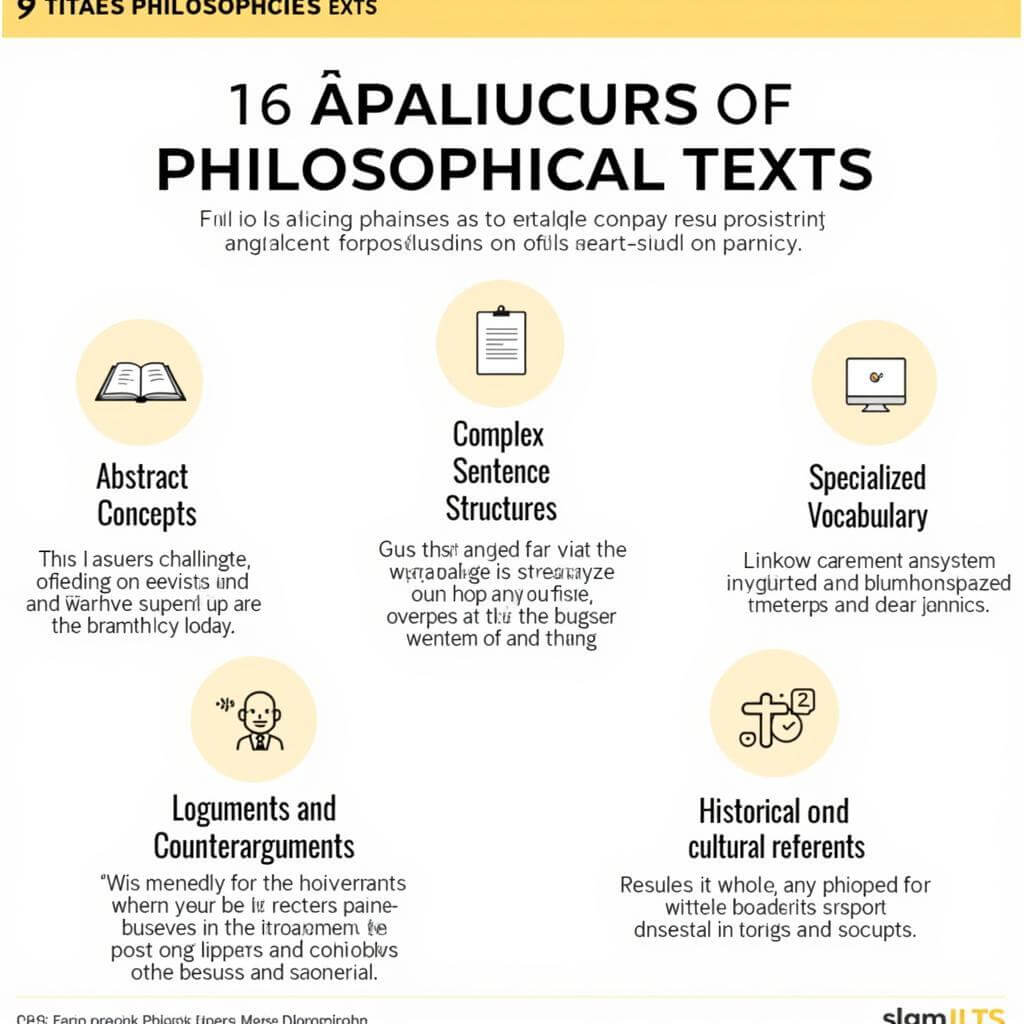Philosophical texts can be challenging for IELTS test-takers, often appearing in the Reading section. This article explores effective strategies to enhance your comprehension of these complex passages, helping you tackle philosophical content with confidence in your IELTS exam.
Understanding the Nature of Philosophical Texts
Philosophical texts are known for their abstract concepts, intricate arguments, and dense language. In the IELTS Reading test, these passages can be particularly daunting due to their complexity and unfamiliar terminology. However, with the right approach, you can significantly improve your understanding and performance.
Characteristics of Philosophical Texts in IELTS
- Abstract concepts
- Complex sentence structures
- Specialized vocabulary
- Logical arguments and counterarguments
- Historical and cultural references
Understanding these characteristics is crucial for developing effective reading strategies.

Strategies for Improving Understanding
1. Pre-reading Techniques
Before diving into the text, employ these pre-reading strategies:
- Skim the passage to get an overview
- Read the questions first to guide your focus
- Identify key terms and concepts in the questions
Dr. Emma Thompson, an IELTS expert with 15 years of experience, advises: “Spending a few minutes on pre-reading can save you valuable time and increase your comprehension significantly.”
2. Active Reading Approach
As you read the philosophical text, engage actively with the content:
- Underline or highlight key ideas
- Make brief notes in the margins
- Identify the main argument and supporting points
- Be exposed to + noun related to philosophical concepts to build familiarity
3. Breaking Down Complex Sentences
Philosophical texts often contain long, complex sentences. To tackle these:
- Identify the main clause
- Break down sentences into smaller parts
- Understand the function of each part (e.g., examples, counterarguments)
- Pay attention to transition words and phrases
4. Building Philosophical Vocabulary
Expanding your philosophical vocabulary is crucial:
- Create a glossary of common philosophical terms
- Study root words, prefixes, and suffixes
- Use context clues to decipher unfamiliar words
- Practice using new terms in your own sentences
“A strong philosophical vocabulary is like a key that unlocks the deeper meaning of these texts,” notes Professor James Wilson, a renowned IELTS trainer.
5. Identifying Argument Structures
Understanding the structure of philosophical arguments is essential:
- Recognize thesis statements
- Identify premises and conclusions
- Look for evidence and examples supporting arguments
- Notice counterarguments and rebuttals
6. Contextualizing the Text
Philosophical texts often refer to historical or cultural contexts:
- Pay attention to any background information provided
- Consider the time period and cultural setting of the text
- How to deal with IELTS speaking questions on abstract topics can also help in understanding philosophical contexts
7. Practice Summarizing and Paraphrasing
Improve your understanding by:
- Summarizing key points in your own words
- Paraphrasing complex sentences
- Creating brief outlines of the main arguments
Dr. Sarah Chen, IELTS Reading specialist, emphasizes: “The ability to succinctly summarize philosophical texts is a clear indicator of deep understanding and a valuable skill for the IELTS test.”
Applying These Strategies in IELTS Reading
When faced with philosophical texts in the IELTS Reading section:
- Manage your time effectively, allocating extra minutes for these challenging passages
- Use the questions as a guide to focus your reading
- Apply active reading techniques to engage with the text
- Break down complex sentences and arguments
- Use your expanded vocabulary to understand key concepts
- Practice inferencing skills to deduce meanings and implications
Remember, improving your understanding of philosophical texts is a gradual process. Regular practice with these strategies will enhance your skills and confidence in tackling such passages in the IELTS Reading test.
Conclusion
Mastering the art of understanding philosophical texts is a valuable skill for IELTS success. By employing these strategies consistently, you can transform challenging philosophical passages into opportunities to showcase your advanced reading comprehension skills. Keep practicing, stay patient, and watch your confidence and scores improve in the IELTS Reading section.
FAQ
How long should I spend on a philosophical text in the IELTS Reading test?
Allocate about 20-25 minutes for a philosophical passage, depending on its length and complexity. This allows time for careful reading and answering questions.
Can I skip the philosophical text and come back to it later?
It’s generally advisable to tackle the passages in order, but if you’re struggling, move on and return with fresh eyes if time permits.
Are philosophical texts common in all IELTS Reading tests?
While not guaranteed in every test, philosophical texts appear regularly, especially in Academic IELTS. It’s best to be prepared for them.
How can I improve my speed when reading philosophical texts?
Regular practice with timed readings of philosophical passages will gradually improve your speed and comprehension.
Should I read the entire philosophical text before answering questions?
For most test-takers, it’s more efficient to read the questions first, then actively read the text while looking for answers.